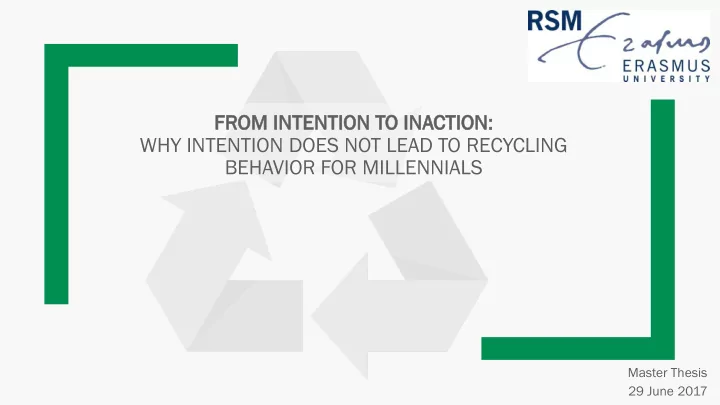

: WHY INTENTION DOES NOT LEAD TO RECYCLING BEHAVIOR FOR MILLENNIALS Master Thesis 29 June 2017
A CHANGING WORLD ■ Climate change ■ Extreme weather events ■ Increasing levels of waste ■ A changing generation
A SOLUTION ■ Reduced GHG emissions ■ Reduced pollution ■ Less waste in landfills ■ Less soil contamination ■ Saves energy Why do millennials form the intention to recycle waste but fail to do so in public places?
RESEARCH METHOD Qualitative research Interviews & observations Millennial generation Public recycling in city of Rotterdam Three step coding process with ATLAS.ti
MODEL OF RECYCLING BEHAVIOR Environmental concern Concern for humans Attitude Monetary value Process simplification Upbringing Subjective norm Perceived pressure of others Intention Ascription of responsibility Perceived behavioral control Actions of others Easiness of recycling External Recycling Convenience to recycle behavior Facilitating Knowledge to perform behavior conditions Awareness of recycling Internal Awareness Awareness of consequences Upbringing Past Automatic behavior behavior/habit Recycling as norm Affective Variable Category evaluation
INTENTION Attitude Subjective norm Perceived behavioral control Environmental concern Upbringing Ascription of responsibility “Personal benefit? No, I am just doing “Yeah, it was very important in the “That’s the responsibility from local it for the good of the planet.” government I think.” family that I grew up with. So I am raised with recycling.” Concern for humans Actions of others Perceived pressure of others “But any personal benefits for me. “And I used to recycle, but then my Yeah maybe for me, for my children, “Just because we are supposed to.” mom would put rubbish into the for their children.” recycling bin and then it kind of Monetary value defeated the point.” “Yeah, if I get paid to recycle!” Process simplification “Makes peoples’ lives easier. If we do that here it might mean hours or days less of processing.”
FACILITATING CONDITIONS External Internal Knowledge to perform behavior Easiness of recycling “Sometimes it’s complicated to separate some waste. For “I think it’s really easy to use, you just have to example, you see the chips, I know there is a kind of take the right one. So it is really no extra effort package which contains plastic and paper. So how are whatsoever" you going to do it?” Convenience to recycle Awareness “If there is an option to separate, people will do it. But we are also lazy, so if it is not, we are still going “I just throw everything away and I don’t really pay to think about ourselves and not about the attention to it.” environment.” “And maybe I don’t know enough on how the impact will be if we do separate.” Easiness of recycling External Convenience to recycle Recycling Facilitating Knowledge to perform behavior behavior conditions Awareness of recycling Internal Awareness Awareness of consequences
PAST BEHAVIOR/HABIT Automatic behavior Upbringing Recycling as norm “I just grew up like that. I just “Yes, it’s automatically. You “I think because it’s like drilled do it. Without a real reason.” look where to put it and just do into us anyways. So now it’s part it.” of my normal routine to just do it now.” Upbringing Past Recycling Automatic behavior behavior/habit behavior Recycling as norm
AFFECTIVE EVALUATION “I think I just feel better as a human being. I think at least I can help a little. It’s good to do that.” “No I mean you feel a little tiny sense of goodness that might be spend maybe 1 or 2 seconds more helping out.” “I think there is more a feel good aspect, you learn that you are doing something good for the environment rather than an actual tangible benefit you get from recycling.” Affective Recycling evaluation behavior
MODEL OF RECYCLING BEHAVIOR Environmental concern Concern for humans Attitude Monetary value Process simplification Upbringing Subjective norm Perceived pressure of others Intention Ascription of responsibility Perceived behavioral control Actions of others Easiness of recycling External Recycling Convenience to recycle behavior Facilitating Knowledge to perform behavior conditions Awareness of recycling Internal Awareness Awareness of consequences Upbringing Past Automatic behavior behavior/habit Recycling as norm Affective Variable Category evaluation
PUBLIC IC VS. HO HOUSE SEHOLD LD RECYCLING Intention Recycling behavior Facilitating conditions Past behavior/habit Affective Variable Category evaluation
NEXT STEPS Increase recycling aware reness ss and educ ucation n through schools, advertisements and company cooperation Increase numbe ber o r of re recycle le b bins s in city center and residential areas Create coherent r recycle s strategy within the Netherlands and the EU
NEXT STEPS Increase recycling aware reness ss and educ ucation n through schools, advertisements and company cooperation
NEXT STEPS Increase numbe ber o r of re recycle le b bins s in city center and residential areas ?
NEXT STEPS Create coherent r recycle s strategy within the Netherlands and the EU
CONCLUSION Why do millennials form the intention to recycle waste but fail to do so? Intention Facilitating conditions Combination of self- interest and long-term concern for communities and Past behavior/habit Recycling behavior environment Upbringing and pressure of others Affective evaluation Ascription of personal responsibility and actions of others
THANK YOU FOR YOUR ATTENTION
Recommend
More recommend